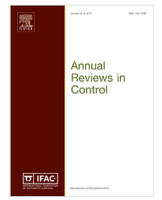Systems Medicine
of Infectious Diseases
Research and Consulting Group
Machine Learning for Multiscale Analysis of Biomedical Data
ANNUAL REVIEWS IN CONTROL
Special Issue: Systems&Control Research Efforts Against COVID-19 and Future Pandemics
Call for Papers Here
The novel coronavirus SARS-CoV-2 causes a severe, potentially fatal acute respiratory syndrome, COVID-19, that has paralyzed our societies, leading to prolonged self-isolation and quarantine. Indeed, COVID-19 is a major threat to humans, with alarming levels of spread and death tolls. The WHO situation report published on 30 March 2020 estimated that confirmed cases were almost 700 000, with more than 33 000 deaths. Being that COVID-19 is a global threat, tackling the pandemic requires a global effort involving not only all countries, but also the scientific community at large, across all fields and disciplines.
This call invites the Control Community to contribute from different perspectives to the fight against COVID-19, including the development of appropriate theoretical foundations of epidemiology that may impact the response to future outbreaks of viral or bacterial infections. Several new data sets conveying either epidemiological or clinical information are being made available daily; however, fast data integration at different levels is needed.
Modeling and control insight can be crucial to explain and predict the complex dynamics of the disease evolution, and to devise the best strategies to contain the contagion and treat COVID-19 patients. Containing the virus is a mixed discrete-continuous control problem under multiple objectives. Besides various uncertainties, social and economic costs need to be considered in the control strategies.
Our control community can contribute to the solution of several problems, using our technical tools. Topics of interest include, but are not limited to, the following:
- COVID-19 transmission networks for the different affected countries.
- Social networks, social interactions and their effect in the COVID-19 pandemic.
- Control strategies on complex networks to mitigate and prevent the spread of the infection.
- Nonlinear observers and parameter estimation to predict a global situation from data-driven models of the pandemic.
- In-host models, representing the interactions between the virus and the immune system, to be used as computational tools to evaluate new therapies.
- Algorithms to differentiate genetic and epigenetic factors in pandemic diseases.
- Control of ventilators in intensive care patients, as well as fast industrial development of ventilators.
- How to allocate available human and physical resources to achieve optimal patient outcomes.


